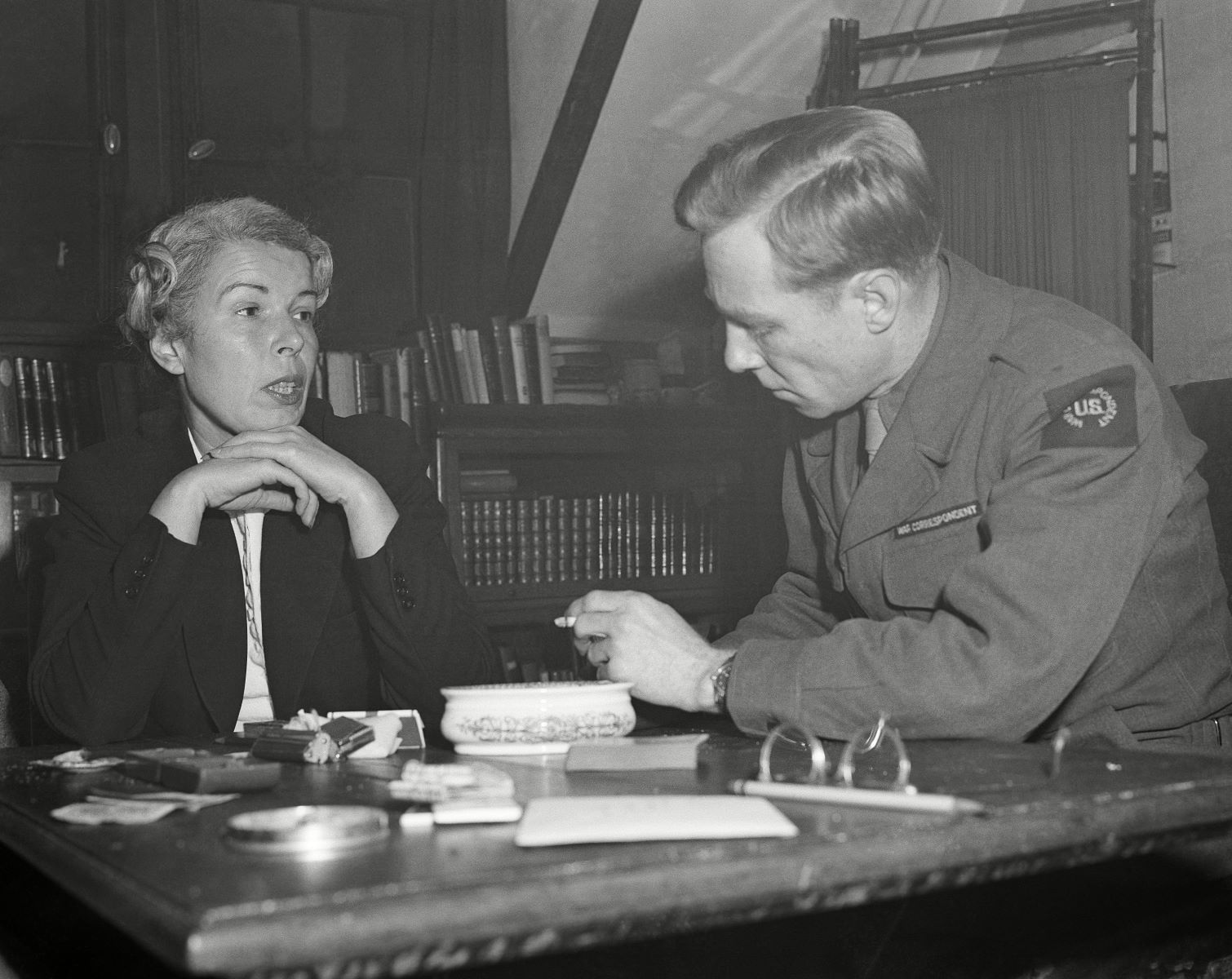
Who was Axis Sally? This name refers to Mildred Gillars, an American broadcaster who worked for Nazi Germany during World War II. Why is she significant? Gillars became infamous for her propaganda broadcasts aimed at demoralizing Allied troops. What did she do? She used her radio show to spread Nazi propaganda, often speaking directly to American soldiers, trying to weaken their resolve. What happened to her? After the war, she was captured, tried for treason, and sentenced to prison. Why should you care? Her story is a chilling reminder of the power of media and the impact of propaganda. Ready to learn more? Let's dive into 34 intriguing facts about Axis Sally that will shed light on her life, actions, and legacy.
Key Takeaways:
- Axis Sally, a nickname for two American women who broadcasted Nazi propaganda during WWII, aimed to demoralize Allied troops. Their broadcasts used music, fake news, and American accents to manipulate emotions and spread misinformation.
- Mildred Gillars and Rita Zucca, the most well-known Axis Sally broadcasters, faced legal consequences after the war. Their controversial actions had a mixed impact on Allied soldiers and remain a subject of books, films, and academic studies.
Who Was Axis Sally?
Axis Sally was a nickname given to two American women who broadcast Nazi propaganda during World War II. Their voices were meant to demoralize Allied troops and sway public opinion. Let's dive into some fascinating facts about these infamous broadcasters.
-
Mildred Gillars was the most well-known Axis Sally. Born in Maine, she moved to Germany in 1934 and began working for Nazi radio.
-
Rita Zucca was the other Axis Sally. An Italian-American, she broadcast from Rome and targeted Allied forces in Italy.
-
Gillars' broadcasts often included music, news, and anti-Semitic commentary. She aimed to make soldiers doubt their mission and feel homesick.
-
Zucca's style was more conversational. She tried to appear friendly and relatable, hoping to gain the trust of her listeners.
-
Gillars was arrested in Berlin in 1946. She was later extradited to the United States to face charges of treason.
-
Zucca avoided trial by claiming Italian citizenship. She was not prosecuted by the U.S. government.
The Propaganda Machine
The Nazi regime used Axis Sally as part of a larger propaganda effort. These broadcasts were carefully crafted to manipulate emotions and spread misinformation.
-
Joseph Goebbels was the mastermind behind Nazi propaganda. He believed radio was a powerful tool for influencing public opinion.
-
Gillars' most famous broadcast was "Home Sweet Home." She played American music and read letters from supposed soldiers' families to make them feel nostalgic and lonely.
-
Zucca often spread false information about Allied losses and Nazi victories. This was meant to demoralize troops and create confusion.
-
Both women used their American accents to sound more credible. They hoped soldiers would trust them more than other Nazi broadcasters.
-
Gillars earned the nickname "Berlin Bitch" from Allied soldiers. Her harsh tone and anti-American rhetoric made her widely disliked.
-
Zucca was known as "Axis Sally of Rome." Her broadcasts were less aggressive but still aimed to undermine Allied morale.
Legal Consequences
After the war, the actions of Axis Sally did not go unpunished. Legal proceedings and public opinion played significant roles in their fates.
-
Gillars was tried for treason in 1949. She was convicted on eight counts and sentenced to 10 to 30 years in prison.
-
Her trial was one of the first major treason trials in U.S. history. It set a precedent for how such cases would be handled.
-
Gillars served 12 years before being paroled in 1961. She lived quietly in Ohio until her death in 1988.
-
Zucca's fate was less severe. She lived out her days in Italy, largely avoiding the spotlight.
Impact on Soldiers
The broadcasts of Axis Sally had a mixed impact on Allied soldiers. Some found them amusing, while others were genuinely affected.
-
Many soldiers saw the broadcasts as a joke. They would listen for entertainment and to mock the propaganda.
-
Some soldiers were disturbed by the broadcasts. Hearing familiar music and voices from home could be unsettling.
-
Psychological warfare was a key goal of Axis Sally. The Nazis hoped to weaken the resolve of Allied troops through emotional manipulation.
-
Gillars' broadcasts sometimes included messages from supposed American POWs. These were meant to sow doubt and fear among soldiers.
-
Zucca's broadcasts often featured fake news reports. She claimed Allied forces were suffering heavy losses, hoping to demoralize listeners.
Cultural Legacy
Axis Sally remains a controversial figure in history. Her story has been the subject of books, films, and academic studies.
-
The 2021 film "American Traitor: The Trial of Axis Sally" stars Al Pacino and Meadow Williams. It dramatizes Gillars' life and trial.
-
Books about Axis Sally include "Axis Sally: The American Voice of Nazi Germany" by Richard Lucas. This book provides a detailed account of her life and actions.
-
Gillars' story is often used as a case study in propaganda and psychological warfare. Her broadcasts are analyzed for their techniques and impact.
-
Zucca is less well-known but still studied by historians. Her broadcasts are examined for their role in the broader Nazi propaganda effort.
Personal Lives
Beyond their roles as Axis Sally, both women had complex personal lives that influenced their actions.
-
Gillars was engaged to a German officer. This relationship likely influenced her decision to stay in Germany and work for Nazi radio.
-
Zucca's family had strong ties to Italy. Her Italian heritage played a role in her decision to broadcast for the Nazis.
-
Gillars studied music before moving to Germany. Her background in the arts helped her craft engaging broadcasts.
-
Zucca worked as a journalist before the war. Her experience in media made her a valuable asset to the Nazi propaganda machine.
-
Both women faced significant public backlash after the war. They were seen as traitors and collaborators.
Final Years
The later years of Axis Sally's lives were marked by attempts to move past their controversial pasts.
-
Gillars converted to Catholicism after her release from prison. She sought forgiveness and redemption for her actions.
-
Zucca lived quietly in Italy. She avoided public attention and rarely spoke about her time as Axis Sally.
-
Gillars taught at a Catholic school in Ohio. She tried to rebuild her life and contribute positively to her community.
-
Zucca's death in 1998 went largely unnoticed. Her role as Axis Sally remains a lesser-known chapter of World War II history.
The Legacy of Axis Sally
Axis Sally's story is a mix of intrigue, betrayal, and propaganda. Her broadcasts during World War II aimed to demoralize Allied troops, but they also left a lasting mark on history. After the war, she faced trial for treason, highlighting the consequences of her actions. Her life serves as a reminder of the power of media and the impact of wartime propaganda. Understanding her role helps us grasp the complexities of war and the individuals who shape its narrative. Axis Sally's legacy is a cautionary tale about the influence of words and the responsibilities that come with them. Her story remains a fascinating chapter in the annals of history, offering lessons on loyalty, influence, and the far-reaching effects of propaganda.
Frequently Asked Questions
Was this page helpful?
Our commitment to delivering trustworthy and engaging content is at the heart of what we do. Each fact on our site is contributed by real users like you, bringing a wealth of diverse insights and information. To ensure the highest standards of accuracy and reliability, our dedicated editors meticulously review each submission. This process guarantees that the facts we share are not only fascinating but also credible. Trust in our commitment to quality and authenticity as you explore and learn with us.


